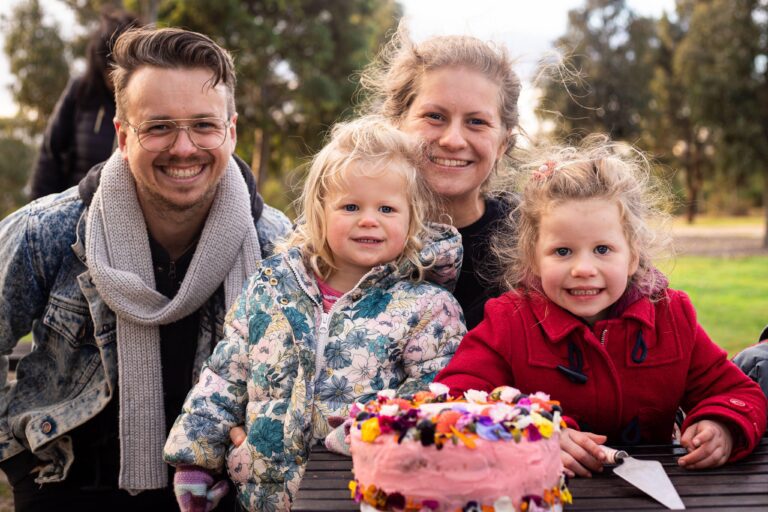When people study at theological college, there’s much to be gained – especially when the college experience is enriched by real-life experiences and challenges already encountered during a ministry apprenticeship.

Rick with his wife Ellen and children
Rick Warner is a living example.
Importantly, he also knows the impact that apprentices can have on others – in fact, for his entire church experience, he’s always had them around. As he puts it:
“From the very earliest in church, I had an awareness of these people who were training to do ministry full-time… I never had that illusion that the people who are in ministry had just ‘gotten there’.”
This year at the Reach Australia Conference, Rick met one of the apprentices who had ministered to him when he was a young child, back when his grandparents brought his family along to church and his parents committed their lives to Jesus.
A turbulent childhood
The care and teaching that Rick and his family received from those who ministered to them at their church in these early years turned out to be crucial.
When Rick was 13, his mum suffered a complication following a heart transplant, and died. He knew that she had confidence and hope in Christ – and he was confident in her hope for herself – but he says that he didn’t yet have that same hope for himself.
However, with the help of his grandfather and the teaching of his church leaders, Rick says that “the pieces of my own sin and Jesus being able to give us a confidence because of what he accomplished on the cross all clicked into place.”
And so there he was, a teenager asking really big questions, surrounded by a culture of ministry apprentices headed for full-time ministry. He became increasingly convinced through his teenage years of the reality of the resurrection – and that if this is true then it’s not optional but eternity-changing for everyone – and by the end of high school, Rick felt a ministry apprenticeship would be in his future too.
It didn’t happen immediately. He worked in a variety of jobs first for many years, but he always knew an apprenticeship was on the cards. In 2015, he commenced his MTS apprenticeship at EV on the Central Coast, the church he’d attended since his early childhood.
Real questions; real impacts
Rick’s apprenticeship took him well out of his comfort zone. He was involved in youth groups, high school ministry, preaching, leading small groups, one-to-one ministry… and he says it was a time of working out how to serve, with a huge range of people whose lives he often felt he knew very little about:
“My ministry was with people who were 12 to people who were 80. It was quite a broad demographic… if I hadn’t done MTS then I probably would have had experience of giving talks to 16-year-olds, but I never would have had the experience of how to help someone to think through what their retirement looks like.”
Preaching to mixed-age congregations and ministering to older people was something he found daunting. He was a newly-wed with no kids, and many of these people’s lives were so much more complex than he could imagine. How was he to speak into situations he felt he knew nothing about?
However, Rick reflects that this was one of the most fruitful things for him as an apprentice. His wise MTS trainer patiently and sympathetically allowed him to voice his fears, comforted him, and then encouraged him to find a way through:
“He didn’t just answer my questions… he didn’t just ‘fix it’ – he was really intentional in helping me work out for myself what the next steps would be… without MTS I don’t think I would have had that framework of actually thinking through those processes and working out how to problem-solve.”
The other side of the coin: time to go to college
The decision to go to theological college was not an easy one. The rewards and excitement of full-time ministry beckoned, and Rick considered whether he could just continue on without doing the ‘hard yards’ of Bible college education. But he was encouraged by all he’d observed in his Christian pastors and other mentors over the years, whose knowledge of the Bible was rigorous and deep.
Ultimately, he had to acknowledge the value of both engaging in practical ministry training and building his theological knowledge – two crucial sides of the same coin.
Rick says that he, together with other apprentices at college, benefited from theological study because it gave him “robustness in thinking”. “Whereas MTS felt like it gave us the tools,” says Rick, “theological training then helped us to understand why we’re using the tools that we’re using.”
Rick believes having done an MTS apprenticeship before college had a huge impact not only on how he approached theological study, but what he got out of it.
“My exposure in MTS to people from different demographics to my own, and different hurts and questions, meant that I came into college with those questions…
“If I hadn’t done MTS beforehand I don’t think I would have been as hungry to go back into full-time ministry. If I’d just gone straight to college, I think I wouldn’t have seen as intensely the need for people to be in full-time ministry. And I think that meant that I had a hunger to get the most out of college while I was there…”
He’s glad he had that experience first, to build a foundation for study and shape his approach to it. He’s glad he didn’t go straight from wanting to do full-time ministry to college, or straight into full-time ministry itself. He says:
“If I had, I wouldn’t have had an opportunity to have those questions raised for me and then an opportunity to sit down and really work through them.”
It’s not surprising that Rick, with his past experience as a grieving teenager searching for hope and answers, has developed this heart to serve people from a range of demographics and with wide-ranging life experiences, hurts and questions. And it’s the crucial combination of practical ministry training with rigorous engagement in studying God’s Word that has equipped him to do so.
